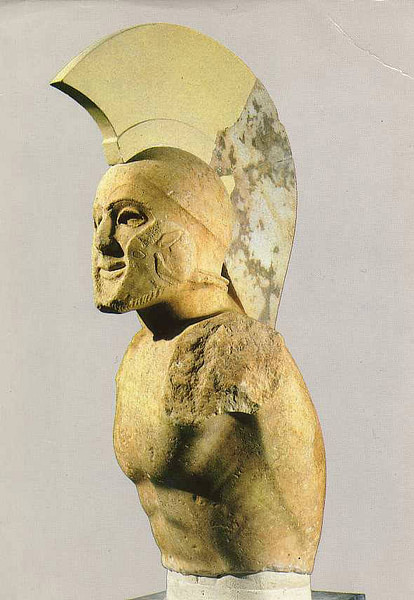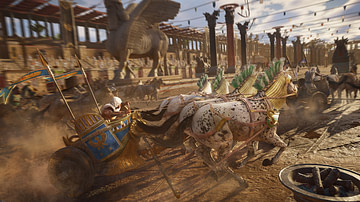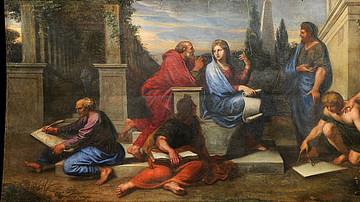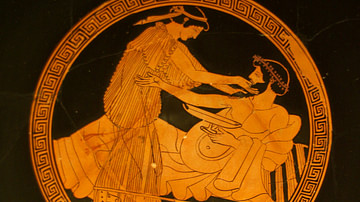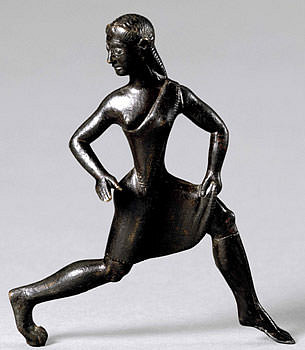
Gorgo was the queen of the Greek city-state of Sparta, daughter of the king Cleomenes (r. 520-490 BCE), wife of King Leonidas (r. 490-480 BCE), and mother of King Pleistarchus (r. 480-458 BCE). Her birth and death dates are unclear as women were not considered as important as men to the historians who recorded her time.
It is generally believed, based on inferences from Herodotus (l. c. 484 - 425/413 BCE), that she was born in either 518 or 508 BCE, was already married to King Leonidas by 490 BCE, and survived his death at Thermopylae in 480 BCE. She was most likely still alive during the reign of her son Pleistarchus, but for how long and what role she played at his court are not known.
She is a figure of note for her wisdom, cleverness, and the apparent authority she assumed in the lives of those around her. Both her father and her husband listened to her counsel, and she is one of the few women mentioned by Herodotus in his Histories. The scholar and novelist Helena P. Schrader writes:
The most remarkable thing about Gorgo, wife of King Leonidas I of Sparta, is that we know anything about her at all. Herodotus and other ancient Greek historians are far more likely to mention Persian queens than the wives of Greeks – not because Persian women were more powerful than their Greek counterparts, but because Persians had several wives, and so it was sometimes useful to record by which of them a certain Persian figure had been born. Since Greeks had only one legitimate wife, there was no need for such clarification when it came to prominent Greek citizens. Even the names of Spartan queens are rarely mentioned. We do not know, for example, the names of either Leonidas' mother or his stepmother, the "second wife" who caused all the trouble in the Agiad family in the second half of the 6th century BC.
The near complete absence of Greek women in ancient history (as opposed to Greek mythology and drama) is a function of the fact that ancient historians were predominantly Athenian males from the classical or Hellenistic periods. Athenians of these periods did not think women should be seen – much less heard – in public. Women had no public role and so no business in politics or history. As Pericles said in one of his most famous speeches, "The greatest glory of a woman is to be least talked about, whether they are praising you or criticizing you." (Thucydides, History of the Peloponnesian War, 2:46.). Gorgo was, by that standard, a hopeless piece of scandal. (1)
Early Life
As a Spartan girl of nobility, Gorgo would have been brought up at court trained in singing, dancing, literature, and, especially, physical education. Unlike Athenian women, who were considered lesser than males and relegated to their homes, Spartan women were free to pursue an education, own land, initiate divorce, and go where they pleased (within reason). It has been speculated, therefore, that there were other women as notable as Gorgo, probably many, whose lives and deeds were simply not recorded.
The first account of her in Herodotus is from when she was eight or nine years old (though she is thought to have actually been older). This was during the time of the revolt of the Ionian city-states against Persian rule (c. 499-493 BCE), which was instigated by the tyrant of Miletus, Aristagoras, and supported by the city-state of Athens. When the revolt failed, Aristagoras fled to the Greek mainland and then to the Peloponnese to enlist the aid of Sparta in driving the Persians from Ionia.
King Cleomenes had already sent Aristagoras away, refusing this request, but Aristagoras visited him at his home and attempted to bribe him. Interestingly, Herodotus reports, Gorgo was present in the room with her father when Aristagoras arrived and, when Aristagoras asked the king to send the child away so they could talk privately, Cleomenes refused and told him to speak freely in front of her.
Aristagoras then offered him a substantial bribe for his assistance, which was declined, so he offered the king more and still more money until Gorgo said, "Father, your visitor is going to corrupt you if you don't get up and leave" (Herodotus, 5.51). Cleomenes took her advice and refused Aristagoras' bribe. Schrader writes:
In no other Greek city but Sparta would a female of any age have been allowed to be present, much less heard and heeded, at a meeting between heads of state. Gorgo's advice was all the more remarkable because it was good. It was Athenian aid for the Ionian revolt that brought the wrath of Persia down on mainland Greece, leading some people to quip that it was easier to bamboozle thirty thousand Athenian men than one Spartan girl. (2)
Marriage to Leonidas
In 490 BCE, Cleomenes died leaving no male heir to the throne, and so his half-brother Leonidas became king. Leonidas and Gorgo were already married by that time, and so she became the queen of Sparta. It is during this period that Herodotus' other tale concerning her takes place. The Persians, under King Darius I, tried to invade Greece in retaliation for Athens' aid to the Ionian Greeks in 490 BCE but were defeated at the Battle of Marathon.
When Darius died, his son Xerxes the Great swore to complete the work his father had begun and assembled the largest army ever put into the field up to that time. When Xerxes was preparing his war machine, a man named Demartus was living in the Persian city of Susa. Demartus had been co-ruler with Cleomenes until 491 BCE when Cleomenes had forced him into exile after a political dispute.
Demartus became aware of Xerxes' plans for the military campaign to Greece and wanted to warn the Spartans, but he did not know how. Susa was deep in the Persian Empire and any message being sent toward Greece would most likely be apprehended by Persian officials before it reached the border.
Herodotus writes:
This was very risky - what if he should be caught? - and the only way he could find to get the message to them was to take a folding writing-tablet, scrape off the wax, and write about the king's decision on the bare wood of the tablet. Then he covered the message up again with melted wax so that during its journey the tablet would not arouse the suspicions of the guards on the route. (7.239)
When the tablet reached Sparta and was brought to the king, no one knew what to do with it. While they were puzzling over why Demartus would have sent them a blank writing tablet and what it could possibly mean, Gorgo deduced that it was probably a message sent encoded. She suggested that they scrape off the wax and, when they did, they found his message about the Persian invasion. They then sent word to Athens and the other city-states, which enabled the Greeks to prepare for war.
If Gorgo had not recognized that the message was beneath the wax, the Persians would most likely have taken Greece by surprise or, at least, the Greeks would not have been able to ready themselves as early as they did. It is also to Leonidas' credit, and that of the Spartan court, that they were not foolish enough to ignore a suggestion simply because it came from a woman. It is interesting to speculate on what would have happened if the message had been sent to Athens instead of Sparta.
Leonidas, of course, would become famous for his last stand at Thermopylae with his 300 Spartans during the invasion of 480 BCE. Schrader writes:
When Leonidas marched out to die at Thermopylae, Gorgo asked him for instructions. His answer was a final compliment to her. He said: "Marry a good man and have good children." Not sons, children. Leonidas wanted Gorgo not to mourn him but to be happy, and he valued daughters as much as sons – probably because he had learned from Gorgo the importance of clever and loyal women. (2)
Anecdotes
A number of anecdotes have been attributed to her which evidence a strong and intelligent woman. Once, when she was visiting Athens, a woman asked her why it seemed only Spartan women could control their men. She answered, "Because only Spartan women give birth to men", meaning that only Sparta produced real men.
That she was free enough in her life to travel to Athens with Leonidas, and apparently take part in his official business in the city, is testimony to the freedom of Spartan women in general and Gorgo's status specifically. After Leonidas' death, Pleistarchus became the king of Sparta and Gorgo vanishes from the historical record.
Gorgo continues to be regarded as one of the most clever and influential women in ancient history, not only as the wife of Leonidas but for her own contributions. She was featured in the film The 300 Spartans (1962 CE) where her role was played by Anna Synodinou and in the films 300 (2006 CE) and 300: Rise of an Empire (2014 CE) played by Lena Headey and portrayed according to the traditional view of her as a strong and noble woman.
